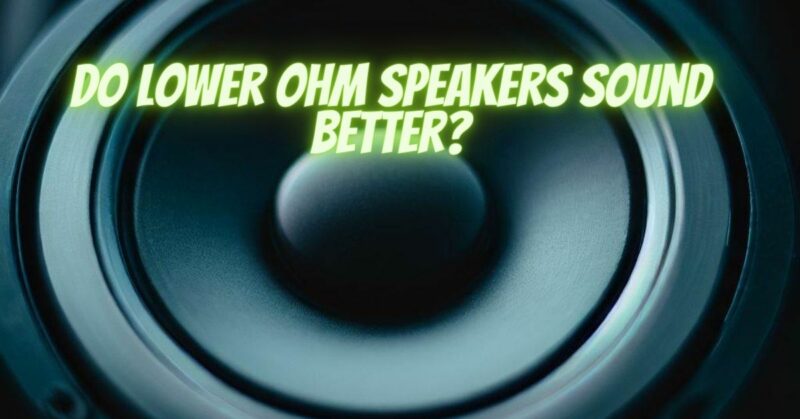The world of audio equipment can be complex, and when it comes to speakers, the technical specifications can often leave consumers with questions. One such question that frequently arises is whether lower-ohm speakers sound better than their higher-ohm counterparts. In this article, we will explore the concept of speaker impedance (measured in ohms) and its relationship with sound quality to determine if lower-ohm speakers genuinely offer superior audio performance.
Understanding Speaker Impedance
Speaker impedance, measured in ohms (Ω), refers to the electrical resistance a speaker presents to the amplifier. It is one of the key specifications that describe a speaker’s electrical characteristics. Common speaker impedance ratings include 4Ω, 6Ω, 8Ω, and 16Ω, though others may exist.
The Relationship Between Speaker Impedance and Sound Quality:
The simple answer to whether lower-ohm speakers sound better is: not necessarily. Speaker impedance alone does not determine sound quality. Instead, sound quality is influenced by a combination of factors, including the speaker’s design, build quality, materials, and the overall system’s compatibility.
Let’s break down some aspects of speaker impedance and sound quality:
- Amplifier Compatibility: Lower-ohm speakers demand more current from the amplifier to produce the same volume as higher-ohm speakers. It’s essential to match the speaker’s impedance with the amplifier’s capability. Running a lower-ohm speaker with an amplifier that can’t handle it can result in distortion and potentially damage the equipment.
- Efficiency: Lower-ohm speakers tend to be more efficient at converting electrical power into sound energy. This means they can produce higher volumes with less power. However, efficiency doesn’t necessarily equate to better sound quality.
- System Balance: Achieving the best sound quality often depends on creating a balanced audio system. Components like the amplifier, source equipment, and speakers should complement each other. Using lower-ohm speakers with the right amplifier and source can contribute to excellent sound quality, but it’s not a guarantee.
- Speaker Design: The design of the speaker itself plays a significant role in sound quality. Factors like the quality of materials, driver design, enclosure construction, and the tuning of the speaker all contribute to how it reproduces sound.
- Listening Environment: The acoustic properties of your listening room can also affect sound quality. Factors like room size, shape, and acoustic treatment can impact your perception of sound.
When Lower-Ohm Speakers May Excel:
Lower-ohm speakers may have advantages in certain scenarios:
- High-Power Applications: In situations where high power levels are required, such as professional audio setups or large home theater systems, lower-ohm speakers can efficiently handle the power and produce loud, clear sound.
- Matching Components: When paired with a compatible amplifier that can supply the required current, lower-ohm speakers can deliver impressive sound quality.
- Specific Sound Preferences: Some audiophiles may prefer the characteristics of lower-ohm speakers for their potential to provide more dynamic and impactful sound.
In summary, the notion that lower-ohm speakers inherently sound better is a misconception. Speaker impedance is just one of many factors influencing sound quality. The choice between lower-ohm and higher-ohm speakers should be based on your specific audio system, listening preferences, and equipment compatibility. Ultimately, achieving great sound quality involves careful consideration of the entire audio setup, including the amplifier, source components, room acoustics, and the design and quality of the speakers themselves.

